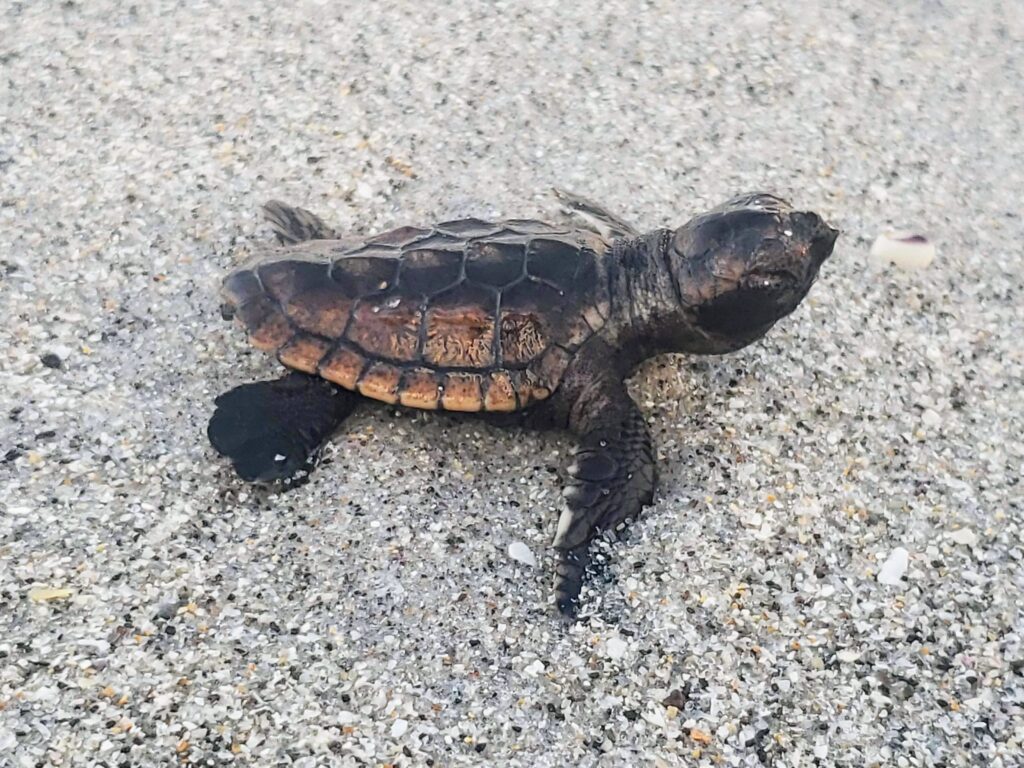White sand, coconut trees lining the beach and reefs near shore? Sounded good to us. The small beach town of Cahuita is on Costa Rica´s Caribbean Coast, about 4 hours from San José, south of Limon. We decided this would be the perfect introduction to the country on our first visit here. High on the list was checking our the well-known Cahuita National Park, on the small side, but rich in animal, plant and marine bio-diversity.
Transportation in Costa Rica
The bus ride was uneventful, but slow and HOT. The fare was fair for what you got, but Costa Rica does not seem to have developed the long-distance bus routes with the comfy, modern vehicles we saw elsewhere throughout South America. That being said, maybe they haven´t needed to. Nothing is ever too far, and roads are often hilly and twisty. Grayline and a company called Interbus exist for tourists (it seems exclusively) who can pay for a smaller vehicle, air conditioning and a driver. These services charge between $30 and $50 per leg, and seem to be the only option to get between some destinations with out multiple bus transfers or passing back through San José. We had one Tico (Costa Rican) tell us that they are not big travelers generally. Most people have the modest goal of getting a house and providing for their family. A younger tour guide added later that it´s much easier (economically) for Costa Ricans to travel to Panama or Nicaragua than within their own country. Maybe that´s why it seemed options for budget travelers were so few. Everything has been developed for the foreign tourist arriving with more money than time to spend.
Cahuita’s Laid-Back Vibe
Cahuita was an interesting mix of Caribbean and Central American culture and traditions. There were many local people who spoke more English than Spanish, or at least spoke Spanish with what seemed to be a strong Caribbean accent. The town was very laid back, and we loved the jerk chicken and coconut sauces we got on the food. Jamaica definitely made its presence known.
There are plenty of activities options, including snorkeling (guide required), diving, nature walks, horseback riding, etc. We decided to strike out on our own. We set out early in the morning and walked through the national park to Cahuita Point. Along the way we saw white faced Capuchin monkeys, two-toed sloths, butterflies, iguanas, line upon line of leaf-cutter ants (we were sure to take a big step over) and a bright yellow viper. We heard howler monkeys making a ruckus in the distance (scary) and one hanging dead by his tail high in a tree. It looked like he went in his sleep, poor guy.
Beaches
The beach was lovely, with clear, warm water, and we took a swim at several spots! Even though there is supposed to be lots of great life to see, we passed on diving, though. An earthquake in 1992 put the reef offshore in danger, as it raised it high enough to be exposed during low tide. The marine environment is further affeted by illegal logging inland and its resulting silt runoff, as well as the use of fertilizers by nearby fruit companies. Hopefully, the reef and surrounding forest and park will be given the chance to survive and regenerate.
Where We Stayed
Our host at our humble guesthouse was Elijah. His relatives surely arrived with many others to work the banana plantations or work on the railroad line to San José (many came for these reasons in the late 1800s). We really enjoyed talking to him, though our chats were brief. There are only three rooms at Brisas del Mar, and they are basic, but waking up to the sound of waves breaking on the beach made it well-worth it.










What is that monkey holding in his hand? Lunch? 🙂
Yeah, it was some kind of fruit. His friends wanted our lunch which I had in a plastic bag. Seems the monkeys there know what a grocery bag looks/sounds like!
The beaches are beautiful, I gotta get there!
dad
Awesome! So many people never get to see Costa Ricas caribbean coast as it is much less developed than the Pacific! Did you get a chance to check out northern Guanacaste? Places like Playa Grande and Santa Rosa National Park are awesome for nesting turtles and scuba diving!
Thanks, Jon. We really enjoyed the laid-back vibe of the Caribbean coast. We didn’t see northern Guanacaste, but we always love to have something to look forward to for a future visit. We actually didn’t have the chance to dive in Costa Rica either, so we look forward to checking out your dive shop. What time of year is best for diving? And when do the turtles nest there?